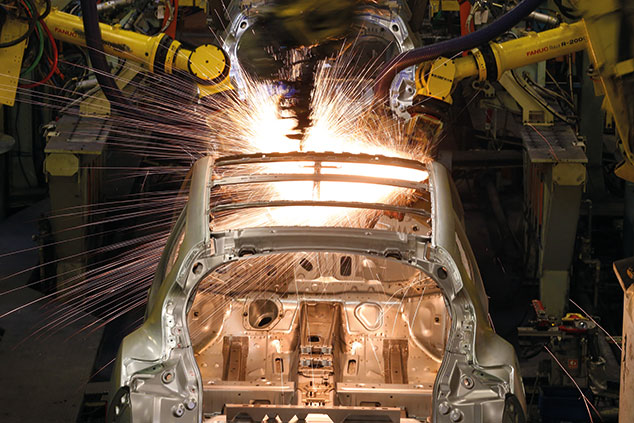
Bad news in the British car industry breaks almost daily. Plant closures relating to the sudden fall from grace of diesel vehicles, fears for the industry post-Brexit, and falling car prices have been major worries. One company putting a more positive spin on events, however, is Trifast (LSE: TRI), which announced its annual results earlier this month.
Trifast, which manufactures fasteners (nuts, bolts, rivets and screws), reported sales and profit growth of 6% at constant exchange rates in the year to March 2019, but slightly more than half of the gain in revenue came from PTS, a company it acquired at the beginning of the financial year in April.
A third of Trifast’s revenue comes from the automotive sector. Trifast fasteners hold dashboards together, for example. Despite all the bad news, Trifast sold 6% more fasteners by value to automotive customers than it did the previous year. As you might expect, sales in the UK, the company’s biggest automotive market, contracted, but Trifast continued to grow its relatively small share of much larger overseas markets.
Trifast is expanding abroad
The company’s strategy, established in the wake of the financial crisis more than a decade ago, has been to cosy up to big multinational equipment manufacturers – not just in the automotive sector, but also in the domestic appliances and electronics sectors. The multinationals are consolidating suppliers as they standardise component design around the world.
In theory, firms that can supply wherever a manufacturer operates have an advantage over local rivals, both in terms of physically being able to supply equipment wherever the client needs it and in providing technical support, which increasingly, the company says, drives sales. Trifast’s fastest-growing market is also its smallest, the US, where the company is investing heavily.
The numbers bear out the theory. Through acquisitions and its focus on multinationals, Trifast has reduced its dependence on the UK. Five years ago it earned halfits revenue here, while today it is closer to a third.
Meanwhile, it has expanded its product range to include more complex fasteners. These are more profitable, and less easily substituted for rival products. Profitability has steadily improved, while the company has kept a lid on debt. Return on capital in the year to March 2019 was 15%, 2% higher than Trifast’s ten-year average, but although Trifast is confident about its prospects, trading is unlikely to be this good every year.
Like many cyclical businesses, Trifast’s history resembles the plot of the classic science-fiction story Nightfall, which is written through the eyes of a journalist on an exotic planet witnessing what may be the end of civilisation. In the book, scientists have calculated that the planet, which has six suns, experiences a total eclipse every 2,000 years. Archaeological evidence of fire and destruction tells the scientists collective insanity took hold in the unprecedented darkness and wiped out earlier civilisations. Armed with this knowledge, the scientists hope to stay sane.
Trifast’s customers are like Nightfall’s suns: periodically the light goes out. People buy fewer cars and dishwashers during recessions, and when they do retailers and manufacturers run down stocks instead of ordering and making more.
A more robust business
After the financial crisis of 2008, Trifast experienced a near-catastrophic drop in demand for fasteners, but perhaps memories of that time have inspired the company to build a more robust business. Trifast has impressively loyal employees, many of whom worked through the last down-cycle when, by its own account, the company lost its way, its directors were booted out, and a previous generation of executives was invited back to take over and lead the company’s recovery.
The big worry about exporters such as Trifast is that rising trade tensions will bring about another widespread recession. However, the hope is that the company has diversified enough not only to survive, but also to survive relatively unscathed.
To reveal Nightfall’s ending would spoil a great novella, but Trifast is likely to make a very good investment – if not now, then next time there is a total eclipse.
Kicking the tyres: inflated profits?
There is a lot of change going on at Trifast, mostly acquisitions and the renewal of the company’s internal processes and IT system, expected to cost £15m in total over several years.
The standard accounting treatment of acquisitions such as PTS and “Project Atlas”, its IT upgrade, requires Trifast to deduct the associated costs to arrive at the profit figure. However, the company believes these are one-off costs and do not reflect the underlying performance of the business.
In 2019 Trifast chose to exclude more than £3m of expenses related to Project Atlas, nearly £1.5m in acquisition related costs, and share-based payment charges of more than £2.5m from its preferred profit figure. Operating profit, so adjusted, was more than £24m, 42% higher than the £17m figure reported in its income statement. Clearly, when making these adjustments, there is an opportunity for a company to inflate profits. Investors will argue forever about the finer points, but it is reasonable to write off acquisition costs. Big investment projects such as Project Atlas are more of a grey area as companies invest all the time. And there is very little justification for ignoring share-based payments, which are routine incentives. The figures used in this article include the cost of share-based payments, and on that basis Trifast currently trades on a debt-adjusted price/earnings (p/e) ratio of 18.